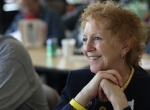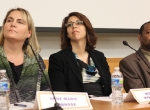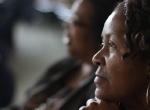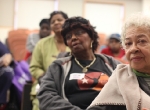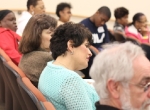
Messages from C0-Hosts

Welcome to the Helping Hands Intergenerational Resource and Information Conference! We understand fully that time is precious, and in the case of the weekends, that’s particularly true. We are grateful that you decided to spend time here – and hope by day’s end, you will be, too.
Raising a child is difficult enough in society today. Choosing to raise a relative’s child for the good of that child’s welfare and the collective family is not only challenging, but also admirable. Due to incarceration, addiction, or neglect, we are witnessing a rise in intergenerational families like yours.
Nationwide, more than 7 million children live with grandparents, where some 1 in 5 of those grandparents serve as primary caretakers – an increase of more than 30 percent within the last 20 years alone, according to the U.S. Census Bureau. And these tallies don’t include the countless uncles, aunts, cousins and older siblings who, despite considerable additional financial and emotional burdens, choose to step into that breach when parents walk away.
These are people filled with unconditional love for our next generation – people like you.
Yet, despite these statistics, the tools to make these efforts easier too often are not apparent. The organizers for this event – Grands as Parents, Turning Points for Children, and members of my office – have assembled a series of targeted workshops and discussions, as well as a wealth of resources and support, all in one place to help you and your family.
You will receive information and answers from legal, financial, educational and behavioral health experts. You will have the opportunity to connect with helpful agencies, organizations and fellow caregivers. And you will have the ear of lawmakers – myself included.
By day’s end, we hope to help solidify a plan that will enhance your quality of life. We need your voice, not just today, but throughout the process as we seek to advance your cause, in Harrisburg and beyond.
Above all, thank you for attending the Helping Hands conference. Your selfless deeds inspire us all.
Sincerely,
Anthony H. Williams
Pa Senate – 8th District
A Message from
GRANDS AS PARENTS, INC.
 Grandparents supporting relatives who have become caregivers fortheir families assuring a good quality of life that every child deserves.
Grandparents supporting relatives who have become caregivers fortheir families assuring a good quality of life that every child deserves.
2227 N. Broad Street 19132
215-236-5848 | Fax: 267-299-8189
E-mail: grandsasparents1@verizon.net
Website: www.gapsnow.org
May 14, 2011
Grandparents and relative caregivers do care. We are the ones who step in to raise our grandchildren, nieces, nephews and cousins when the traditional family unit is broken. We at Grands As Parents firmly believe that we fill in the gaps in our grandchildren’s lives.
As a grassroots organization formed in 1996 to support and advocate for grandparents raising their grandchildren, we are excited to welcome you to the 2011 Helping Hands Intergenerational Caregivers Conference. We recognize that grandparents are increasingly serving as the primary parents motivated solely by the love of their grandchildren.
We also recognize the pressure and stress that grandparents are under when they assume this role as primary caregivers. Many adults, who have already raised their children, find themselves thrust into the role of second time parenting. Grandparents face a myriad of challenges in nearly all aspects of their lives, such as housing, educational, behavioral and economic barriers. It isunder this umbrella that this conference was born to assist, support and educate caregivers and arm them with the tools to succeed. We hope you find the information you receive today helpful and we understand firsthand what you are going through. Please know that our organization, Grands As Parents, State Senator Anthony H. Williams and Turning Points for Children understand the struggle and sacrifices made and are committed to helping you.
Sincerely,
Eileen Brown – President
Jean Hackney – Vice President
A Message from
May 14, 2011
Grandmothers, Aunts, Sisters, Grandfathers, Uncles, Brothers – Kinship Caregivers all, welcome to the Helping Hands Conference. As the name implies hopefully you will find today’s experience to be informative and helpful and maybe even a little inspiring.
One message that I want to make sure you take with you is that you are not alone in this courageous and loving course you have undertaken, caring for the child(ren) of a relative. Across the state of Pennsylvania alone there are over 60,000 loving caregivers like you caring for over 200,000 children. These numbers are at once inspiring and shocking.
They inspire because there are so many people like you willing to make the personal sacrifices to care for and raise another’s child. Sure, I know that you see it as not an option to do otherwise, but the truth is that there is/was another option and you chose not to take it. Your love, your commitment, your sense of family was too strong to allow you to do otherwise and in that you inspire all.
At the same time the numbers are shocking because they highlight the enormity of the situation. There are not just a few children living in this situation but hundreds of thousands and as you know there is precious little in the way of supports available for them or for you. In fact there is practically no acknowledgement of the fact that so many of our children are faced with growing up without their parents.
I know I do not have to tell you about the challenges that you and the child(ren) you are here for face. In many ways they are the most at-risk for many of the obstacles and pitfalls faced by all children growing up. Adding to that are the challenges you face with all of the systems in society, schools, medical, housing, legal, etc. And yet despite everything you get up each dayand do the best you can for love of a child.
So let me say thank you. Thank you for caring, for your sacrifice, for the example you set and for the love you share. I hope that you will leave today with some information or connection that will help you and make your burden just a little lighter. If nothing else leave knowing that there are people like Senator Williams and organizations like Turning Points for Children, thatappreciate the struggles and sacrifices you make and are committed to doing as much as we can to find ways to help you. God Bless you.
Sincerely,
Michael Vogel
415 S. 15th Street Philadelphia, PA 19146 • 215-875-8200 • www.turningpointsforchildren.org
Day-At-A-Glance
8:30-9:00
Registration /Sign In – Lobby Entrance
Continental Breakfast – by Room 137
9:15-9:45
Welcome/Plenary Session – Auditorium
10:00-11:00
Legal: Custody and the Law
Family Dynamics of Kinship Care – Auditorium
11:15-12:15 – Workshop II
Navigating Government Resources/Benefits – Auditorium
Advocacy
Legislative Roundtable – Private Invitation – Room 137
12:30 -1:15
Lunch w/Keynote Speaker, Elmer Smith – Cafeteria/Wilson Hall
1:30-2:30
Panel Discussion, led by Trudy Haynes – Auditorium
2:30-3:00
Conference Close – Recognitions, Announcements, Raffle for Prizes –Auditorium
3:00
Distribution of Stipends & Certificates – Registration/Lobby
8:30-1:30
Resource Pavilion Open – Atrium/Lobby
Keynote Speaker, Elmer Smith
 Elmer Smith is a columnist with the Philadelphia Daily News where he has been employed for nearly 30 years. Starting as a sports writer, he was elevated to sports columnist, then appointed to the paper’s editorial board and later selected to be a featured editorial columnist, a position he has held for morethan a decade.
Elmer Smith is a columnist with the Philadelphia Daily News where he has been employed for nearly 30 years. Starting as a sports writer, he was elevated to sports columnist, then appointed to the paper’s editorial board and later selected to be a featured editorial columnist, a position he has held for morethan a decade.
Smith also is the former host of The Exchange, a daily talk show on the now defunct WHAT-AM and a panelist on Comcast Sportsnet’s Daily News Live.
Prior to joining the Daily News, Smith worked at the Philadelphia Evening Bulletin, where he began his journalism career almost 40 years ago. During his time with the Bulletin, he worked as a city hall reporter covering the Green and Rizzo administrations and City Council. He stayed with the paper until it ceased publication in 1983.
A product of the Philadelphia public school system and Temple University, Smith has remained committed to producing the next generation of journalists. For 30 years, he has served as an adjunct professor of journalism at his alma mater, teaching news writing and opinion writing to full-time journalism undergraduate and graduate students.
Smith has won numerous writing and civic awards, including the coveted Nat Fleisher award for lifetime achievement from the Boxing Writers Association of America, three first-place column writing awards from the Keystone Press Association, and a multiple winner of the local chapter of Sigma Delta Chi’s Journalist of the Year award.
He was named first-place winner in the columnist category for the prestigious National Headliners Award and among the first-ever recipients of WDAS-FM’s Claim Your Culture award and $1,000 cash prize. And the American Red Cross recognized him with a public service award for columns he filed about relief efforts in hard-hit areas such as Haiti and Somalia.
Smith is involved with several youth outreach programs, such as sessions with his adopted class at the Reynolds Elementary School in North Philadelphia, as a reader for pre-school and kindergarten students in Philadelphia public schools, and as a journalism mentor and with the Philadelphia Futures Sponsor-a-Scholar. He is a trustee and member of the Tabernacle Baptist Church in Burlington, N.J. He also lends his voice to the church’s senior choir.
He is married to the former Mary Ann Green, a veteran Philadelphia public school educator. Beyond teaching, her career stops included assistant principal at Simon Gratz High School, assistant leader for the Roxborough Cluster and special assistant to the chief academic officer for the School District ofPhiladelphia.
The Smiths have one daughter, Cheryl, a Rutgers University graduate, and two granddaughters, Ashley and Aaliyah. Ashley recently earned her telecommunications and journalism degree from the University of Florida.
Conference Objective
Description: Advocacy, Resources, Legislation & Solutions
Workshops
Legal: Custody and the Law
This workshop will provide an overview of the family court system in Philadelphia and provide information regarding the legal basics of child custody that every caregiver should know.
Topics and information will include: what is physical and legal custody, who can file for custody and how one can obtain custody; what are custodial rights regarding grandchildren, other relative children, and children who may not berelatives; medical consent authorizations; standby guardianships; the Philadelphia Department of Human Services (DHS) and foster care; protection from abuse, and more.
Caregivers will learn about the legal processes relating to their custodial rights. Strategies on how to navigate the court system and better protect their families and their futures will be discussed.
Children/Family“The Family Dynamics of Kinship Care”
Dr. Joseph Crumbley & Andrew J. DeVos, MED, CBH
Learning Objectives for participants are:
- Understanding how kinship care impacts and changes family roles, relationships, expectations, responsibilities
- Identifying the emotional and transitional issues relative caregivers may experience as kinship care providers
- Developing methods of coping with the emotional challenges of providing kinship care
Finance: “Navigating Government Resources/Benefits”
Rebecca Vallas, Esquire from CLS
What am I eligible for? How do I apply? What happens if I’m turned down or cut off of benefits? This workshop will focus on the array of publicly funded benefits and programs that exist to support children and their caregivers. Topics discussed will include Supplemental Security Income (SSI), Social Security benefits for dependents, Temporary Assistance for Needy Families (TANF), SNAP (formerly known as Food Stamps), Medicaid, the Children’s Health Insurance Program (CHIP), subsidized childcare, and others. Strategies for getting and keeping benefits will also be discussed, as well as appeal rights and tips for dealing with the agencies that administer benefits.
Advocacy: “How to Advocate for Yourself!”
AARP presenters: Ray Landis & Estella Hyde
AARP State President Estella Hyde and AARP Advocacy Manager Ray Landis will lead a workshop discussing how groups can effectively organize to promote their priorities and agenda. The workshop will focus on the Direct Action Organizing model, which helps organizations and individuals to develop strategy charts in order to keep focused on the process for achievingyour goals. Hyde and Landis will discuss the elements of the strategy chart and lead participants through the process of completing a strategy chart, focusing on establishing goals, honestly evaluating the strengths and weaknesses of theirown organization, identifying allies and opponents, naming targets, and planning tactics. Participants will leave the workshop with a simple but effective tool for strategically organizing their efforts to achieve the change they are working toward.
Speaker Biographies
Dr. Joseph Crumbley received his master’s degree and doctorate in social work from the University of Pennsylvania. He is in private practice as a family therapist, trainer and consultant. His clinical experience includes adoption, foster care, chemical dependency, couples therapy, physical and sexual abuse. His most recent areas of specialization have been kinship care and transracial adoptions. Crumbley co-authored a book with Robert Little, Relatives Raising Children: An Overview of Kinship Care (CWLA Press, 1997). Crumbley’s second book is Transracial Adoptions and Foster Care. (CWLA Press, 1999).
Andrew J. DeVos, M.Ed. has worked at Community Behavioral Health (CBH), a contracted nonprofit corporation that serves the Philadelphia’s Department of Behavioral Health & Intellectual Disabilities Services, since 1996. In his current role as director of member services, DeVos leads a staff of 40 member service representatives, who assist individuals and families infinding the most appropriate mental health and substance abuse health treatment, and advocate on behalf of those who are having challenges within the service system to resolve barriers to effective treatment. He began his behavioral healthcareer at the Dr. Warren E. Smith Community MH/MR Center in 1992, listening to and documenting hundreds of individual life stories at the center’s Lehigh Avenue location as an assessment specialist, and in 1994 went to work for KidsPeace, a large provider of mental health services for youth and families in the Lehigh Valley and in several other states.
Estella Hyde is a retired professor emeritus of Edinboro University of Pennsylvania, having taught there for 13 years in the Department of Nursing. Prior to that, she had taught at other institutions and had been employed as a staff nurse at local hospitals. Hyde has been active in many organizations and volunteer activities and has sat on numerous community and professional committees and boards. She currently is the state president of AARP Pennsylvania, a volunteer post. Hyde has also participated in several panels and workshops involving grandparents raising grandchildren and has helped to start a localsupport group for such caregivers. Hyde is a graduate of numerous universities in Pennsylvania and Ohio, receiving associate’s, bachelor’s, master’s, and doctoral degrees in the nursing field. She resides in Linesville with her husband. They are the parents of two sons and have two grandchildren.
Barry Kassel, MSW, Esq. is a staff attorney at the Support Center for Child Advocates (Child Advocates). He received his bachelor’s degree and master’s of social work from Temple University. He graduated from the Temple University School of Law, where he received the Temple Law School Alumni Award for Distinguished Advocacy. Prior to attending law school he practiced social work, focusing in the area of community mental health, working with families, extended families and individuals in various therapeutic settings. Following law school, he worked for Legal Aid of Lehigh County. Before joining Child Advocates, Kassel was a general practitioner in Philadelphia. In addition to representing child clients in dependency court and in domestic relations matters, he is the staff attorney for the Kids’n’Kin relative caregiver project at Child Advocates.
Ray Landis is the advocacy manager for AARP Pennsylvania. He’s worked for AARP in Harrisburg for 13 years and also spent two years doing communications work for AARP in Michigan. Prior to his work for AARP, Landis worked for 10 years as legislative director and Washington press secretary for the late U.S. Rep. John Murtha of Johnstown. A graduate of the College of William & Mary with degrees in history and government, Landis lives in the Harrisburg area with his family and serves on the Susquehanna Township School Board.
Jennifer Russell, Esq. joined SeniorLAW Center in September 2009 as an Independence Foundation Public Interest Law Fellow. Her project, the Fostering Kinship Care Legal Project, addresses the legal needs and concerns of grandparents and other seniors raising relative children, including children involved in the child welfare system. Russell provides free legal advice, representation and advocacy for seniors at dependency and domestic relations court hearings, helping caregivers as they navigate the family court system. She assists seniors with all questions and concerns regarding the family court system, and provides outreach, training and community education. Russell received her degree from Temple University’s Beasley School of Law in May 2009. During law school, she interned at SeniorLAW Center, and also served as a founding member and president of Temple Alternative Break, a student group dedicated to providing pro bono services to underserved regions of the United States. Upon graduating from the University of Massachusetts, where she earned her bachelor’s degree, Russell interned at the United States Mission to the United Nations. She then served elderly homebound residents of Philadelphia whileworking at Aid for Friends, and gained her desire to pursue legal advocacy while working for a family law attorney in California.
Rebecca Vallas, Esq. joined Community Legal Services in September 2009 as a Skadden Fellow and staff attorney in the aging and disabilities and public benefits units. Her project has focused on representing individuals with disabilities who have lost or been denied SSI and Social Security disability benefits for “non-disability” reasons. She also represents individuals and families facing food stamps, cash assistance, and Medicaid problems, and seniors on long-term care, nursing home, and Medicare-related issues. In addition, she is heavily engaged in national advocacy on SSI, Social Security disability, and other public benefits issues. She has delivered numerous presentations to statewide and national audiences on public benefits topics.Vallas received her degree from the University of Virginia School of Law, where she was elected Order of the Coif. She earned her bachelor’s degree in psychology, graduating summa cum laude from Emory University, where she was elected Phi Beta Kappa. While in law school, Vallas was the president of the Virginia Law Public Interest Law Association and recipient of the Mortimer Caplin Public Service Award, as well as the Pro Bono Award, for completing the most pro bono service in her graduating class.
Panelists
Anne Marie Ambrose
Commissioner, City of Philadelphia Department of Human Services
Anne Marie Ambrose began working as commissioner for the Philadelphia Department of Human Services (DHS) on June 23, 2008. Under her leadership, the agency has made significant progress in improving organizational effectiveness and performance, provider monitoring and oversight, and outcomes for children and families served by DHS. During her tenure, she has set the course by dramatically reducing the number of out of state placements by 78 percent; achieving permanency for children by increasing the number of children leaving foster care with a permanent goal by 9 percent and reducing the number of children in placement by 27 percent. She is committed to better serving the needs of the children and families in Philadelphia. Ambrose envisions DHS becoming a leading child welfare agency in the nation.
From 2005 to 2008 Ambrose was the director of child welfare and juvenile justice services for the Pennsylvania Department of Public Welfare. She was responsible for the operation of four regional offices that provided licensing, conducted child abuse investigations, and offered technical assistance for public and private agencies as well as seven state-run facilities for delinquent youth including one for girls. Ambrose served as DHS deputy commissioner for juvenile justice services from 2001 to 2005. During her tenure, Ambrose developed and led initiatives to reform and improve the juvenile justice system in Philadelphia. She was a tireless advocate for gender-specific services for girls entering the juvenile justice system. Most notable among her accomplishments were her efforts to reduce chronic overcrowding at the Youth Study Center. Her work in population reform resulted in a three-year period that the population at the Youth Study Center was at or below its legal capacity, the longest sustained population reduction in the facility’s history. Ambrose began her career as an advocate for youth in the juvenile justice system in Philadelphia, where she spent 13 years as an attorney for the Defender Association of Philadelphia. She left that position in 2000 to become the deputy commissioner for juvenile justice services for the City of Philadelphia. She is the former vice president of the Council of Juvenile Correctional Administrators and a gubernatorial appointee to the Juvenile Justice and Delinquency Prevention Committee of the Pennsylvania Commission on Crime and Delinquency. In 2007, Ambrose provided critical testimony before both the U.S. House of Representatives and U.S. Senate in support of the reauthorization of the Juvenile Justice and Delinquency Prevention Act. Ambrose is a 1987 graduate of the Emory University School of Law.
Hon. Lori A. Dumas Brooks
Common Pleas Court Judge
The Honorable Lori A. Dumas Brooks is currently serving as a Common Pleas Court Judge in the Philadelphia Family Court,Juvenile Division. She was appointed to fill a vacancy on the Common Pleas Court in February, 2003, when she was nominated by former Governor Mark Schweiker and confirmed by Governor Edward Rendell. She is one of the youngestjudges currently sitting in the Philadelphia Court of Common Pleas.
Judge Dumas Brooks, a graduate of Duke University and North Carolina Central University School of Law is a native ofPhiladelphia. While in law school, Judge Dumas Brooks was a contributing author to the Law Review, on the Dean’s List andranked at the top third of her class.
For projects near and dear to her heart, Judge Dumas Brooks is a force to be reckoned with and always up to the challenge. Paralleling her years of legal experience, Judge Dumas Brooks possesses a strong commitment to her work with issuespertaining to children and families, including her previous role as volunteer attorney for Women Against Abuse. She iscurrently a board member of the Housing Association of Delaware Valley, serving as an advocate to people with housingissues. Her other volunteer positions include her role as a former member of the NAACP, National Coalition of 100 BlackWomen, Urban League Guild and Alpha Kappa Alpha Sorority, Incorporated Judge Dumas Brooks is also active in severalministries at her church, Enon Tabernacle Baptist Church. Judge Dumas Brooks is a former professor at Berean Institute,Harcum College, Eastern College and Temple University where she taught classes in their Paralegal Programs and CriminalJustice Department.
Judge Dumas Brooks is a strong advocate for children. She utilizes her position on the bench for the betterment of children and their families. Her passion to help children is exemplified as she renders thousands of fair and equitable decisions “in the best interests of the child.” To that end, Judge Dumas Brooks is a member of the Juvenile Court Judges’ Commission as well as the National Council of Juvenile and Family Court Judges.
Judge Dumas Brooks’ love for her work is consistently recognized as she has received several honors during her short tenure onthe Bench. Some of those honors include, Philadelphia Business Journal’s 40 under 40 Award, The Tribune Top Ten People toWatch Under 40, The Philadelphia Barristers Distinguished Under 40 Awardfor Achievement and Service, The PhiladelphiaUrban League Young Leader Award, and many others.
Judge Dumas Brooks is married and is the proud mother of three beautiful children. She is the ultimate role model for herchildren. She is deliberate about her actions to ensure that her children are learning the importance of treating people withrespect and that education and hard work are the keys to your goals and dreams.
This dynamic woman represents a well-balanced advocate of justice personified through experience, passion and commitment.
Karren Dunkley
Executive Director, Parent, Family, Community Engagementand Faith Based Partnership, Philadelphia School District
Karren Dunkley currently serves as a deputy chief of parent, family, and community engagement for the School District of Philadelphia, the 8th largest urban district in the nation. Dunkley is hailed among the country’s leading education thinkers, with scholarly emphasis on issues of educational equity, parent, family and community engagement, and intercultural competence. Her office serves all district families to help them become active participants in the academic success and personal development of their children. She and her team provide parents and caregivers with high quality educational services and supports while working to eliminate cultural and linguistic language barriers in order to build effective family, school, and community partnerships. Dunkley is a writer, organizational strategist and cultural critic. She enjoys an illustriouscareer in public education where she received national recognition for her pedagogical excellence as the New York State Assembly Teacher of the Year. Dunkley is currently a doctoral student in the Urban Education Leaders Program at Teachers College, Columbia University in New York City.
Arthur C. Evans, Jr., Ph.D.
Commissioner, City of Philadelphia Department of Behavioral Health
Arthur C. Evans Jr., Ph.D. is commissioner of the Philadelphia Department of Behavioral Health and Intellectual Disability Services (DBH/IDS), a $1 billion healthcare agency. In this capacity, he is leading a major initiative to transform how behavioral health care and mental retardation services are delivered in the city. Since his appointment in November 2004, Philadelphia has begun a transformation of its system to one that focuses on recovery for adults, resilience for children, and self-determination for all people with intellectual disabilities. A clinical and community psychologist, Evans holds a faculty appointment at the University of Pennsylvania School of Medicine. He previously held faculty appointments at the Yale University School of Medicine and Quinnipiac University. Evans has extensive experience in transforming systems of care as well as serving in several national leadership roles. Prior to coming to Philadelphia, he was the deputy commissioner for theConnecticut Department of Mental Health & Addiction Services (DMHAS). In this capacity, he led several major strategic initiatives for the Connecticut behavioral healthcare system. He was instrumental in implementing a recovery orientedpolicy framework, addressing health care disparities and increasing the use of evidence-based practices. Evans has served or is currently serving in several national leadership roles within the realm of the Substance Abuse and Mental Health Services Administration. Those include chair of its Partners for Recovery steering committee, co-chair of the national action group on fostering system reform for adults with serious mental illness, and member of the federal Center for Substance Abuse Treatment advisory committee. He also chairs the national advisory committee for the Robert Wood Johnson’s Path to RecoveryProject and has served as president of the board of directors of the New England Institute of Addiction Studies Inc. (NEIAS). Evans is highly committed to serving people who are underserved and ensuring that all people have access to effective, quality services.
Robin Mekonnen, MSW
Project Director, Penn State and CHOP studies
Robin Mekonnen, MSW is the project director and senior research associate for a study of parenting being conducted in Philadelphia by Penn State University’s department of psychology. Mekonnen is a doctoral candidate at the University of Pennsylvania’s School of Social Policy and Practice, where she received her master’s of social work. Mekonnen’s dissertation examines the reasons for placement disruptions in child welfare cases as they relate to agency and caseworker characteristics. In addition to having worked on a class action child welfare lawsuit, reform projects, and policy research, she was projectdirector for the Children’s Stability and Well Being Study at the Children’s Hospital of Philadelphia and has held a variety of direct social work and mental health positions working with children and families for nearly 20 years. She has co-authored an article on the impact of kinship care on behavioral well being for kids in out of home care. Mekonnen received her bachelor’s degree from the University of Wisconsin-Madison in cultural anthropology. She teaches graduate classes in social policy, history, research, program evaluation and children and families. She holds adjunct positions with Temple University, and the University of Southern California and has been an adjunct at Rutgers University and the University of Pennsylvania.
Panel Moderator, Trudy Haynes
Pioneering Broadcaster
Trudy Haynes is an industry trailblazer and veteran television broadcaster and has brought her unique style back to television with The Trudy Haynes Show. Showcasing the local flavor of Philadelphia, The Trudy Haynes Show features an in-depth look at the “Philly scene” from community happenings to the latest movie premieres and celebrities in town. The Trudy Haynes Show keeps its audience informed, educated and updated about City of Brotherly Love.
Serving as host and executive producer, the Emmy-award winning Haynes has a long and rich history in television broadcasting. Her pioneering career, spanning 40 years, includes becoming the country’s first and Philadelphia’s first African-American television news reporter at KYW-TV3, a CBS affiliate. In addition to being a primetime news reporter, Haynes has hosted several magazine-styled programs including Sunday Side Up and Trudy’s Grapevine. Although retired, Haynesremains an active part of Philadelphia broadcasting with The Trudy Haynes Show.
Combining her woman-on- the-street style with her vast experience and love of Philadelphia’s rich and diverse communities, Haynes brings Philadelphia a show unlike no other, reaching some 500,000 households in the region.
The program can be seen on a host of outlets, including:
- Comcast Leased Access–(Pin/Shopping Channel 190)
- Mondays at 8:30 p.m.
- Fridays at 1 p.m.
- PhillyCAM–(Channel 66 and 966 on Comcast, Channel 29 and 30 onVerizon FiOs)
- Wednesdays at 7:30 p.m.
- Thursdays at 5:30 p.m.
- Saturdays at 7:30 a.m.
- Sundays at 5:30 p.m.
- ION/WPPX
- Every 4th Thursday from 6 to 7 a.m.
- WPHA –Wilco Cable and Wilco On Demand at www.wphatv.com
Individual segments or entire show sponsorship opportunities are available, for details call (215) 241-8773 or email trudyhaynes@comcast.net. Follow The Trudy Haynes Show on Facebook and www.trudyhaynesshow.com.
Sponsors
Co-Hosts
- State Senator Anthony H. Williams
- Turning Points for Children
- Grands as Parents
Supporters
- United Way, SEPA
- Bravo HealthPhiladelphia Department of Behavioral Health and Intellectual disAbility
Friends
- AARP
- Temple Center for Intergenerational Learning
- Health Partners
Donors
- The Franklin Institute
- G. Ellis Group, Inc.
- Please Touch Museum
- Trolley Stop Catering, USP
- 76ers
- Philadelphia Museum of Art
- Philadelphia Zoo
Conference Committee
AARP
Joi Hopkins, Stella Hyde
Grands as Parents
Jean Hackney, Eileen Brown
Grand Central, Inc.
Chartan Nelson
Grand Family Resource Center
Richelle Phillips
Penn State University
Jackie Simon, Suzanne Weltman
Philadelphia Housing Authority
Blair Shaw, Zachary McNeil
Salvation Army
Jamie Johns, Kira Berstecher
Support Center for Child Advocates
Barry Kassel
Senior Law Center
Jennifer Russell
State Senator Anthony H. Williams
Marlene Henkin, Timika Lane, Desaree Jones
Turning Points for Children
Mike Vogel, Gail Ober, Brenda Rich
Resource Pavilion Participants
- AARP
- Bravo Health
- Browne’s Shop Rite
- CHIP
- Consumer Credit Counseling of Delaware Valley
- Councilwoman Blondell Reynolds-Brown
- Department of Behavioral Health
- Department of Human Services
- Education Law Center
- Grands as Parents
- Grand Central
- Grand Family Resource/SOWN
- Health Partners
- PECO
- Penn State
- Philadelphia Corporation for Aging
- Philadelphia Housing Authority
- Senior Law Center
- Temple Center for Intergenerational Learning
- The Trudy Haynes Foundation
- Turning Points for Children
- State Senator Anthony Williams
- SEPTA
- Discovery Toys
- Safe Link
Related News
Fast Facts About Intergenerational Kinship Care
According to the U.S. Census Bureau
- The living arrangements for American children are changing steadily, as some 6.2 million American households are multigenerational – up from 5 million in 2000.
- Grandparents raise roughly 50 percent of children not living with their parents, while about 25 percent are raised by other relatives – aunts, uncles, cousins, or older siblings.
- Among grandparent caregivers, 2 in 3 are women.
- Education implications are serious in grandparent-headed households, where1 in 3 caregivers does not have a high school diploma, as compared to 1 in 8 for parent-headed households.
- While 6 in 10 grandparents report having a full- or part-time job, nearly 1 in 5 (20 percent) of the nation’s grandparents serving as primary caregivers to children live in poverty; in Philadelphia, 2 in 5 (40 percent) live in poverty.
- More localized details
- Grandparents are primary caregivers for 5 percent of Pennsylvania’s children.
- In Philadelphia, 7 in 10 of grandparents serving as primary caregivers are under 60.
According to the Pew Research Center
- Nearly 3 million children are now being raised by grandparents, a figure that spiked by 6 percent in one year – between 2007 and 2008, due to the recession.
- While African Americans and Latinos are common older caregivers nationwide, a 20 percent spike between 2000 and 2008 occurred among white grandparents-turned-primary-caregiver.
According to Generations United
- Be they homeowners or renters, nearly half of intergenerational families face housing cost burdens – paying 30 percent or more of their income – significantly more than is the case with parent-child families.
- Among children aged 5-17 living in households headed by grandparents or other relatives, 1 in 7 has a physical or behavioral disability, compared to 1 in 16 children in parent-headed households.
According to the University of Texas Southwestern Medical Center/ Children’s Medical Center
- Children in kinship care are more likely to wind up with a permanent caregiver than their foster care counterparts (71 percent vs. 56.4 percent).
- Children in kinship care have fewer behavioral and social skills problems, but higher risk of teen pregnancy and substance abuse.
- A study in the February 2011 issue of Archives of Pediatrics and Adolescent Medicine reports that kinship caregivers are significantly more likely to be single, unemployed, older and live in poorer households, yet they receive fewer support services than unrelated foster parents.
Helpful Links
- Pennsylvania Kinship Navigator
- Intergenerational Programs & Aging
- Senate Bill 119, The Intergenerational Family Care Act
Photo Gallery
Click thumbnails to view gallery!



